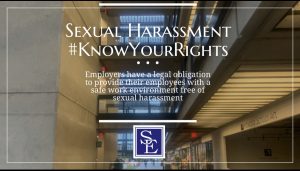Smith Eibeler, LLC, on behalf of our client, Katherine Brennan, has filed an Order to Show Cause For Temporary and Preliminary Restraints against the State of New Jersey (hereinafter, the “State”), from (1) enforcing the “strict confidentiality directive” found in N.J.A.C. 4A:7-3.1(j) against Ms. Brennan and any witnesses in the EEO/AA investigation being launched in response to her December 4, 2018, testimony before the Legislative Select Oversight Committee (“LSOC”)(hereinafter, the “EEO/AA Investigation”); (2) requiring Ms. Brennan to participate in any EEO/AA investigation until after this litigation and any criminal proceedings resulting from Ms. Brennan’s allegation of sexual assault are completed; (3) requiring Ms. Brennan and other witnesses in the EEO/AA Investigation to sign the “strict confidentiality directive” form; (4) requiring the EEO/AA to investigate the numerous violations of the State’s Policy Prohibiting Discrimination in the Workplace (“State Policy”) as set forth in the Complaint; and (5) declaring the “strict confidentiality directive”of N.J.A.C. 4A:7-3.1(j) as null and void.
For the past year, the State has refused to conduct any investigation into any of Ms. Brennan’s reporting that she had been raped by Alvarez. Ms. Brennan exhausted all possible internal avenues of recourse and received no aid or support. Having no other option, Ms. Brennanwas compelled, as a last resort, to bring her allegations into public light. On October 14, 2018, her story was published in The Wall Street Journal. The article laid out in detail not only the rape Ms. Brennan had endured, but also her extensive efforts to prompt the State, through complaints to numerous high level State officials, to take action.
Ms. Brennan’s act of publicly telling her story accomplished what her numerous internal complaints and reports could not: it triggered investigations. As a result of the October 14 Wall Street Journal article, in or about October 2018, numerous investigations and/or reviews were launched in various departments of State and county government, including: (1) an ongoing review by the Middlesex County Prosecutor’s Office of the criminal investigation conducted by the Hudson County Prosecutor’s Office (“HCPO”) into Ms. Brennan’s criminal complaint; (2) a review by Attorney General Gurbir Grewal and the Office of Public Integrity and Accountability (“OPIA”) into Hudson County Prosecutor Esther Suarez’s involvement in the investigation of Ms. Brennan’s allegations of sexual assault; (3) the ongoing investigation by the LSOC into how sexual misconduct complaints are handled by the state, as well as hiring practices; (4) Governor Murphy’s directive to the Division of EEO/AA to review policies and procedures for addressing allegations of sexual misconduct; and (5) an investigation on behalf of the Office of the Governor by former Supreme Court Justice Peter Verniero into the hiring of Alvarez.
 New Jersey Employment Lawyers Blog
New Jersey Employment Lawyers Blog


